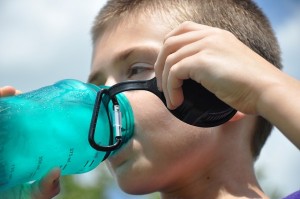 Hydration is important to all humans, but particularly for children, as they have higher water requirements in relation to their body weight than adults and often do not realise that they are dehydrated.
Hydration is important to all humans, but particularly for children, as they have higher water requirements in relation to their body weight than adults and often do not realise that they are dehydrated.
Children do not always recognise the early stages of thirst, and this is exactly what can make them particularly vulnerable to becoming dehydrated, especially when they are playing, taking part in some or other sport or even just during warm weather, all of which can drive up body fluid losses.
Mild dehydration can result in thirst, headaches fatigue, a lack of concentration, reduced mental performance and dry skin. Children who are dehydrated at school can have problems in doing their schoolwork and this can cost them dearly, which is why it is vital that you make sure that your child’s school provides sufficient fresh drinking water for its students.
According to the British Nutrition Foundation (BNF) Guidelines, water is the only fluid which they recommend that children drink plenty of as it hydrates without calories or risking harm to their teeth.
The amount of children that a child needs to drink can vary greatly as it depends on their age, gender, the climate, and how physically active they are. The BNF advises that children between the ages of 4 and 13 should drink approximately 6-8 glasses of fluid daily. Younger children should be given smaller portions of about 150 ml per serving.
Easy ways of keeping your children well-hydrated and functioning optimally include making sure that they begin their day with a glass of plain water and that they further have around 6-8 drinks throughout the rest of the day; ideally water, milk, fruit juice/ vegetable juices. Make sure that your child has sufficient fluids if they are to compete in any sport, and make sure that lunches include water-rich fruit such as berries, pears, watermelon, apples etc.
Get bottled water cooler and mains water cooler from Living-Water.





